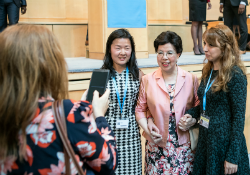World Health Assembly Day 8: progress on addressing noncommunicable diseases in focus

WHO/L. Cipriani
Delegates endorsed an updated set of policy options and interventions to help countries meet global targets to prevent and control noncommunicable diseases (NCDs). It places a particular focus on measures to reduce people’s exposure to factors that increase the risk of developing NCDs. These include taxing tobacco and sugar-sweetened beverages, banning tobacco advertising and reformulating food products to reduce salt content.
Highlights for the WHO European Region
Committee A: The health sector’s role in the management of chemicals
Delegates approved a new road map to enhance the engagement of the health sector in the sound management of chemicals. Both Germany and the Russian Federation underlined the leading role of the health sector in this area, and expressed their support for the road map.
Committee A: Global strategy for women’s, children’s and adolescents’ health: adolescent health
Speaking on behalf of many Member States, including in the European Region, Canada underlined that the 1.3 billion adolescents in the world today are critical to achieving the Sustainable Development Goals (SDGs). Empowering young people and ensuring that their human rights are upheld is essential. Canada stated that adolescents require access to a full range of quality health services, including age-appropriate sexual and reproductive services.
Committee A: Global vector control response
Delegates welcomed the strategic approach proposed in the Global vector control response 2017–2030. It aims to prevent epidemics of vector-borne diseases in all countries, reduce the incidence of these diseases by at least 60%, and cut mortality rates by at least 75% by 2030. Many European Member States underlined the importance of continuing vector control measures and surveillance to prevent the reintroduction of diseases and the emergence of vectors in new areas. They also made a common call for further investment in research on vectors and effective methods to combat them.
Committee A: Progress reports on communicable diseases
Several European Member States made comments during discussions on the progress report for the Global strategy and targets for tuberculosis prevention, care and control. They remarked that although global progress is promising, the challenge of multidrug-resistant tuberculosis (TB) is of great concern, and should be integrated with efforts to address antimicrobial resistance. Member States also pointed to the challenge of HIV/TB coinfection. The Russian Federation noted that it will host the global ministerial conference “Ending Tuberculosis in the Sustainable Development Era: A Multisectoral Response” in Moscow on 16–17 November 2017.
Committee A: Progress in the implementation of the 2030 Agenda for Sustainable Development
Delegates reviewed a report on progress towards the health-related SDGs, and asked the Director-General to continue reporting to Member States every 2 years on global and regional progress. Norway suggested that WHO consider new ways of presenting data, highlighting areas of decreased progress. It also indicated that tobacco, environment, and road traffic safety are critical areas requiring regular reporting. Poland expressed its full support for the implementation of the 2030 Agenda, and explained that noncommunicable diseases and tobacco control are priorities for the country.
Committee B: Ending childhood obesity
Delegates welcomed a plan to implement recommendations made by the WHO Commission on Ending Childhood Obesity. The plan highlights the importance of tackling environments that facilitate access to and the promotion of unhealthy foods, and that make it hard for children to be physically active. Many European Member States expressed their support. A delegate of Slovakia highlighted the link between childhood obesity and food reformulation. In the same vein, Estonia welcomed WHO/Europe’s recommendation to tax sugar-sweetened beverages and its support to countries on this issue. Monaco highlighted its work in promoting breastfeeding, and its action in schools to encourage healthy lifestyles by promoting regular physical activity and teaching young people to prepare meals at home.
Committee B: Cancer prevention and control
Delegates endorsed a set of measures to improve and scale up access to prevention, early diagnosis, prompt accessible treatment and palliative care for cancer. Many European countries expressed their support for this integrated approach, and welcomed the preparation of a world report on cancer containing evidence-informed guidance for scaling up cancer control. The first edition of the report is expected in 2019.
Committee B: Synergy with the Framework Convention on Tobacco Control (FCTC)
Delegates adopted a decision requesting that the Conference of the Parties to the WHO FCTC provide information on outcomes of their biennial meeting to future World Health Assembly meetings. Several European Member States expressed their support for this decision. Norway underlined the clear link between achieving NCD targets, reaching the health-related SDGs and implementing the WHO FCTC.
Committee B: Hearing loss
Delegates agreed to intensify action to prevent deafness and hearing loss. They approved a resolution that calls on governments to integrate strategies for ear and hearing care within the framework of their primary health care systems, among other actions. Several European countries commented on the resolution. Slovakia explained that it introduced universal mandatory hearing screening over a decade ago. Others noted that technological advances have led to the development of methods to support people with hearing loss, but this must be combined with hearing-loss prevention efforts.
Committee A: Promoting the health of refugees and migrants
On 29 May 2017, delegates asked the Director-General to provide advice to countries in order to promote the health of refugees and migrants, and to gather evidence that will contribute to a draft global action plan for consideration at the Seventy-second World Health Assembly in 2019. They welcomed the framework of priorities and guiding principles to promote the health of refugees and migrants developed by WHO, in collaboration with the International Organization for Migration and the United Nations Refugee Agency. During discussions, many European Member States recognized the leadership and important work of WHO/Europe in this area, including the development and adoption of a strategy on refugee and migrant health in 2016. Countries also underlined the importance of WHO’s tailored technical assistance in managing their shared refugee and migrant health activities.



